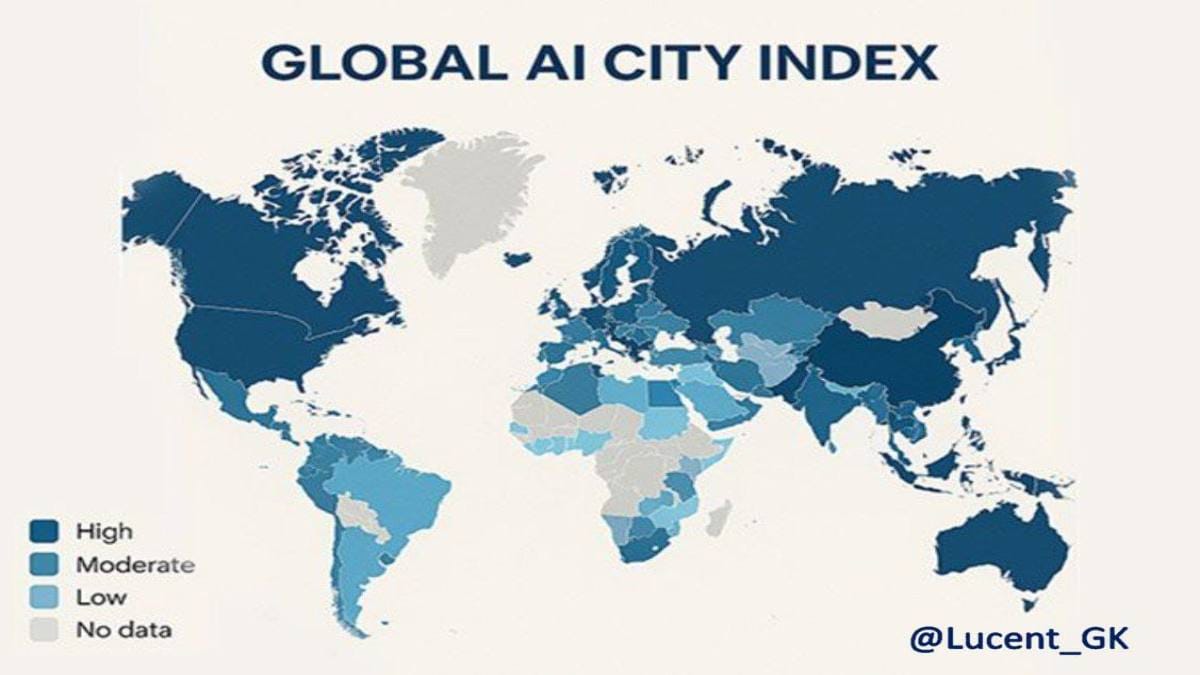
The recently released AI City Index 2025 by Counterpoint Research has once again brought the global race for artificial intelligence leadership into sharp focus. While Singapore emerged as the top performer, followed closely by Seoul, Beijing, Dubai, and San Francisco, India’s tech capital Bengaluru ranked at the 26th position.
For a nation that aspires to become a digital superpower and a hub for emerging technologies, this ranking serves as both a wake up call and a roadmap for the future. The AI City Index 2025 evaluates cities worldwide based on parameters such as AI research output, startup ecosystem, talent availability, government policies, investment flows, and adoption of AI in public services and industry.
The Global AI Landscape in 2025
Artificial intelligence has rapidly evolved from being a futuristic concept to becoming the very backbone of economic competitiveness and societal transformation. Cities such as Singapore have surged ahead because of targeted investments, robust policy frameworks, and an unwavering focus on AI integration across sectors.
Singapore: Ranked #1 in the AI City Index 2025, Singapore’s success story lies in its national AI strategy, talent development programs, and incentives for AI startups. The city state has integrated AI into governance, healthcare, transport, and urban planning.
Seoul and Beijing: With heavy R&D spending and AI-friendly regulations, these cities are at the forefront of innovation. Beijing, for instance, has established entire AI industrial parks, while Seoul has invested in AI education from school to postgraduate levels.
Dubai: The Middle Eastern AI hub has embraced AI-driven governance, smart policing, and AI-based business services, aiming to become “the most AI-ready city” in the world.
San Francisco: The Silicon Valley giant remains a powerhouse for AI startups, deep tech innovation, and venture capital funding, despite growing competition from Asia.
India in the AI City Index 2025 – Bengaluru’s Position at 26th
Bengaluru, often referred to as the Silicon Valley of India, is home to a large pool of software engineers, research institutions, and AI startups. Yet, in the AI City Index 2025, it ranks only 26th. This reflects certain systemic challenges that India needs to address to emerge as a global AI leader.
Key factors limiting Bengaluru’s rank include:
1. Fragmented AI Policy Implementation – While India has released strategic AI frameworks, execution at the city and state level remains slow.
2. Low AI Adoption in Public Services – Compared to global leaders, Indian cities lag in integrating AI into urban governance, healthcare, education, and law enforcement.
3. Funding Gaps – Indian AI startups often face funding constraints, limiting their ability to scale globally.
4. Brain Drain – Many top AI researchers and engineers migrate to the US, Europe, or Singapore for better opportunities and research infrastructure.
Why AI Leadership Matters for India
Artificial intelligence is not just a technology – it is a strategic asset that can determine economic competitiveness, defense capabilities, and societal progress. For India, leadership in the AI domain can:
- Boost GDP growth by enabling automation, predictive analytics, and process optimization across industries.
- Improve public services through AI-powered governance, healthcare diagnostics, and smart traffic management.
- Strengthen cybersecurity and defense preparedness.
- Generate millions of new jobs in AI development, AI ethics, data science, and robotics.
If India wants to rise in future editions of the AI City Index, its cities must be seen not just as outsourcing hubs but as AI innovation epicenters.
Way Forward for India to Improve in the AI City Index
To move from the 26th position to the Top 10, Bengaluru – and India as a whole – must take decisive actions. Here’s a structured roadmap:
1. Establish City Level AI Missions :
Just as Singapore and Seoul have dedicated AI blueprints, Indian cities need localized AI missions with clear targets for AI adoption, research funding, and startup growth.
2. Incentivize AI Startups and R&D:
- Provide tax breaks, subsidies, and easier access to venture capital for AI based enterprises.
- Encourage academia industry collaboration to commercialize AI research faster.
3. Integrate AI into Urban Governance:
- Use AI for smart traffic control, waste management, public safety, and energy optimization.
- Create AI driven citizen service platforms to improve transparency and efficiency.
4. Strengthen AI Talent Pipelines:
- Introduce AI and machine learning courses at the high school level.
- Expand AI focused postgraduate programs with global faculty collaboration.
- Offer incentives to retain top Indian AI researchers.
5. Develop AI Ethics and Regulatory Frameworks:
- Balance innovation with responsible AI usage.
- Establish clear guidelines on data privacy, algorithmic transparency, and ethical AI deployment.
6. Attract Global AI Investments:
- Build AI-focused industrial clusters similar to China’s AI parks.
- Invite foreign companies to set up AI R&D centers in Indian cities.
The Role of Public Private Partnerships
A critical element in climbing the AI City Index rankings is fostering partnerships between governments, tech companies, and universities. Joint AI labs, incubation centers, and funding programs can create a multiplier effect for innovation.
For example, Singapore’s AI Singapore initiative unites the government, industry leaders, and academic institutions in a single mission – a model India can adapt for Bengaluru, Hyderabad, and Pune.
Bengaluru’s Potential to Rise
Despite its current rank, Bengaluru possesses the fundamentals to become a Top 10 AI city:
- A large English speaking technical workforce.
- A thriving IT services sector with growing AI capabilities.
- Global recognition as a startup hub.
If policy bottlenecks are removed and AI adoption is accelerated, Bengaluru can not only improve its position in the AI City Index but also emerge as a global thought leader in ethical, inclusive AI.
Conclusion – From Aspiration to Action
The AI City Index 2025 serves as a mirror for India, reflecting both achievements and gaps. While Singapore leads due to precision planning and aggressive execution, Bengaluru’s 26th position highlights the need for stronger policy frameworks, deeper AI integration in public life, and sustained R&D investments.
India has the talent, market size, and entrepreneurial spirit to be a global AI powerhouse. The challenge now is to convert potential into measurable progress. If Bengaluru and other Indian cities adopt targeted AI missions, foster global collaborations, and encourage innovation at scale, the next edition of the AI City Index could very well see an Indian city in the Top 5.
In the race for AI leadership, it’s not just about technology – it’s about vision, execution, and the will to lead. And for India, the time to act is now.

















